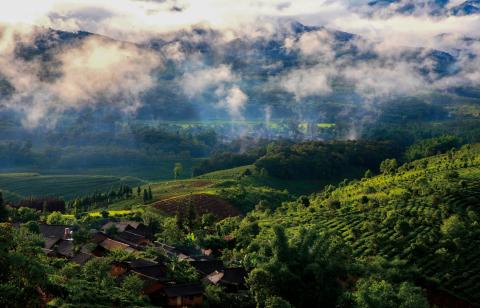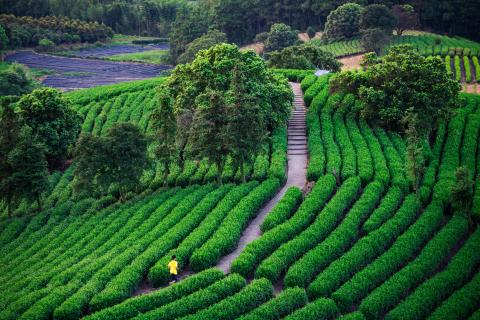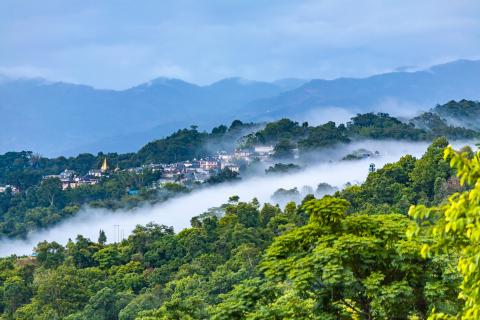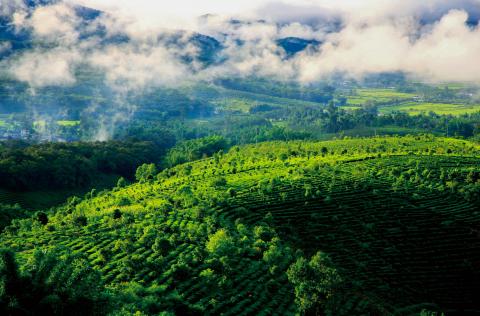Driving along with G214 Road, we pass through chains of mountains in the Sino-Burmese border area. Looking out of the car window, the views of mountains covered in banana and rubber trees are plentiful.
As continuous tea hills and tea gardens come into sight, all of us are overwhelmed by a burst of amusement and jubilation.
Located in Huimin Township of Lancing County of Pu’er City of Yunnan Province, Jingmai Mountain is adjacent to Menghai County of Xishuangbanna and Burma in the east and west, where the border of Xishuangbanna, Pu’er and Burma.
History of Jingmai Mountain

With an altitude from 1,000 to 1,700 metres, Jingmai Mountain has an annual average temperature of 21.2℃. Shrouded by heavy mist throughout the year, the mountain has fertile soil and a favourable ecological environment, which creates optimum conditions for growing tea. It is hailed as the Natural Museum of Ancient Tea Trees.

Also, there is the Bolin Pu’er Tea Manor, not only the largest ancient tea garden of artificial cultivation in China and even the world, but also the unique garden themed with Pu’er tea.
It is recorded by the Blang ethnic group that planting tea trees can be dated back 1,800 years and enjoys great popularity. Anyone who has tasted speaks highly of tea in Jingmai Mountain for its strong flavour.
Promise of Jingmai Mountain
Paaileng is respected as the ancestor of tea by the Blang ethnic group and left teachings for descendants: silver and precious things will be used up some day; oxen, horses and domestic animals will be dead some day; only tea is inexhaustible for offspring. Tea is a source of wealth.
Therefore, relationships of tea and tree, human and mountain have been integrated in Jingmai Mountain. Ethnic groups of Hani, Blang, Dai, Hai and others have been in harmony for thousands of years and jointly develop unique tea culture of Jingmai Mountain.

Green and environmental protection is the best gift for Maijing Mountain at the first sight of it.
Striding over Nanlang River, we enter Jingmai Mountain. Driving along one stone road, which is built with stones, the driver has to be extra careful due to many turnings.
I wondered why the road leading to Jingmai Mountain is not repaired; after all, the economic benefit delivered by Pu'er tea is not small.

My friends found my doubt and explained immediately: to protect numerous ancient tea trees, Jingmai Mountain is not paved with asphalt road. When sunlight blazes in summer, an asphalt road would emit odours and substances which would damage the quality of the tea.
My friend told me a story: for maintaining achievements of environmental protection, the Bolian Group launched a well-renowned Manifesto of Jingmai Mountain ten years ago and invited Jing Yidan, who is a famous CCTV (Chinese television) compere and Chinese Environmental Ambassador.
Together with villagers of the Blang and Dai ethnic groups, they read out the Manifesto of Jingmai Mountain: respect and protect each towering tree, each grass, a beam of sunshine, an inch land and a handful of spring water.
Over the past ten years, they have spared no efforts to protect the hold land of Jingmai Mountain. Meanwhile, the Pu’er Government and Bolian Group go all out to promote the “Historic and Cultural Tourist Project of Tea’s Ancestor” so as to make Jingmai Mountain become a 5A tourist attraction.
Now, the ancient tea grove of Jingmai Mountain has been listed in the Chinese World Cultural Heritage Tentative List and may become a member of the world cultural heritages.

